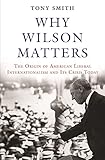Why Wilson matters : the origin of American liberal internationalism and its crisis today / Tony Smith.
Material type: TextSeries: Princeton studies in international history and politics: Publisher: Princeton : Princeton University Press, [2017]Copyright date: ©2017Description: xviii, 332 pages : illustration ; 25 cmContent type: text Media type: unmediated Carrier type: volumeISBN: 9780691171678; 069117167XSubject(s): Wilson, Woodrow, 1856-1924 -- Influence | Wilson, Woodrow, 1856-1924 | Wilson, Woodrow 1856-1924 | United States -- Foreign relations -- 21st century | International relations | Diplomatic relations | Influence (Literary, artistic, etc.) | International relations | United States | Internationalismus | Liberalismus | Außenpolitik | Geopolitik | USA | 2000-2099DDC classification: 327.73 LOC classification: JZ1469 | .S63 2017
TextSeries: Princeton studies in international history and politics: Publisher: Princeton : Princeton University Press, [2017]Copyright date: ©2017Description: xviii, 332 pages : illustration ; 25 cmContent type: text Media type: unmediated Carrier type: volumeISBN: 9780691171678; 069117167XSubject(s): Wilson, Woodrow, 1856-1924 -- Influence | Wilson, Woodrow, 1856-1924 | Wilson, Woodrow 1856-1924 | United States -- Foreign relations -- 21st century | International relations | Diplomatic relations | Influence (Literary, artistic, etc.) | International relations | United States | Internationalismus | Liberalismus | Außenpolitik | Geopolitik | USA | 2000-2099DDC classification: 327.73 LOC classification: JZ1469 | .S63 2017| Item type | Current library | Call number | Copy number | Status | Notes | Date due | Barcode |
|---|---|---|---|---|---|---|---|
 Books
Books
|
Female Library | JZ1469 .S63 2017 (Browse shelf (Opens below)) | 1 | Available | STACKS | 51952000237914 | |
 Books
Books
|
Main Library | JZ1469 .S63 2017 (Browse shelf (Opens below)) | 1 | Available | STACKS | 51952000237907 |
Browsing Female Library shelves Close shelf browser

|

|

|

|

|

|

|
||
| JZ1318 .B894 2015 The global transformation : history, modernity and the making of international relations / | JZ1318 .N483 2014 New constitutionalism and world order / | JZ1318 .S87 2013 أسس العلاقات الدولية / | JZ1469 .S63 2017 Why Wilson matters : the origin of American liberal internationalism and its crisis today / | JZ1480.A57 .V38 2011 America and the Vatican : trading Information after World War II / | JZ4850 .J64 2017 Organizational progeny : why governments are losing control over the proliferating structures of global governance / | JZ4997.5.M54 .L36 2017 Land of blue helmets : the United Nations and the Arab world / |
Includes bibliographical references (pages 295-320) and index.
Introduction: Know thyself : what is "Wilsonianism"? -- Woodrow Wilson on democracy promotion in America -- Democracy promotion through progressive imperialism -- Democracy promotion through multilateralism -- Wilson's Wilsonianism -- Wilsonianism : the construction of an American vernacular -- The rise of neo-Wilsonian theory -- From theory to practice : neo-Wilsonianism in the White House, 2001-2017 -- Conclusion: Reviving liberal internationalism.
The liberal internationalist tradition is credited with America's greatest triumphs as a world power and also its biggest failures. Beginning in the 1940s, imbued with the spirit of Woodrow Wilson’s efforts at the League of Nations to "make the world safe for democracy," the United States steered a course in world affairs that would eventually win the Cold War. Yet in the 1990s, Wilsonianism turned imperialist, contributing directly to the invasion of Iraq in 2003 and the continued failures of American foreign policy. Why Wilson Matters explains how the liberal internationalist community can regain a sense of identity and purpose following the betrayal of Wilson’s vision by the brash “neo-Wilsonianism” being pursued today. Drawing on Wilson’s original writings and speeches, Tony Smith traces how his thinking about America’s role in the world evolved in the years leading up to and during his presidency, and how the Wilsonian tradition went on to influence American foreign policy in the decades that followed for good and for ill. He traces the tradition’s evolution from its “classic” era with Wilson, to its “hegemonic” stage during the Cold War, to its “imperialist” phase today. Smith calls for an end to reckless forms of U.S. foreign intervention, and a return to the prudence and “eternal vigilance” of Wilson’s own time. Why Wilson Matters renews hope that the United States might again become effectively liberal by returning to the sense of realism that Wilson espoused, one where the promotion of democracy around the world is balanced by the understanding that such efforts are not likely to come quickly and without costs. -- Provided by publisher.
1 2

There are no comments on this title.